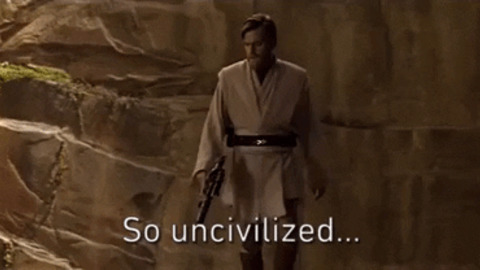Charlaquin
Goblin Queen (She/Her/Hers)
one of the things I often wonder is if the amount of time playing with a group changes this.
I know that my Tuesday night game has run across 3 1/2 editions of the game and 17+ years. We had players come and go, but 3 of the ones that started in 3.0 also are playing now in 5e. We have also had other campaigns in other games over the years...Rifts, Big Eye Small Mouth, Deadlands, DC Superheroes (d6 west end games), Champions, Mutants and Masterminds, Star trek 2 different systems, star wars (d20), Vampire the Masq, Mage the ascension, 2 home brew games, and dozens of board/card games... and as such we can pretty much tell what we are doing.
I not only allow people to guess what I am about to do, sometimes I even let them guess about auto success... We also have standard assumptions from time to time.
Example: "Since my character is trained in Arcana and went to magic college, I identify the damage as hell fire"
yup that's right, the player just goes into it without rolling...if I want I can stop him and say "You have to roll," or "That's not what you think"
I also allow for the fact that some of the PCs need to work with skills they themselves can't describe... "I use my investigate to figure out what happened here I rolled 12 plus my 8 so 20" wont have me ask "So how are you investigating?" or If the player playing the 20 cha bard with skill prof and expertise in diplomacy might say "I calm the two people arguing" I will set a DC because the character is way better with words than he is...
Sometimes this even goes into short hand.
real life example:
Me (DM): you get to the old stone door and it looks like a dragon head.
(Rogue player): Is it trapped? My min roll on perception is 23...
Me: Nope
(Fighterplayer): do we set up the minis or can I just open the door?
Me: no need for minis here, you open the door and enter the main chamber, its just a big chamber full of statues and door. (Priest player name) can identify some statues of known iconic non deity celestials related to dragon gods, and (warlock player name) can see some arcane markings that he thinks are fey in nature. There are 4 doors, 3 heading deeper in, each with a gem stone dragon head over them, and the fourth to the side with a fey mark over it.
(Warlock player): Ok lets start with magic and traps them move to the first dragon door.
(Rogue player): DO I need to roll?
me: no, but if you go to a dragon door it's going to need minis...
(Fighter player): wait, but not the side one, lets do that first to get it out of the way...
No offense, but that sounds not at all fun to me. For me, it has nothing to do with familiarity with the group, and everything to do with the focus of the game. We (that is to say, my players and I) play roleplaying games to imagine ourselves as other people in other situations and make decisions as we think those people in those situations would do. Talking about the game in terms of “these are my stats, so I just succeed on this, right?” and “do I need to set up the minis or should we just keep going?” and “I make a [skill] check” would be entirely too abstract and removed from the fiction for us. If you have fun playing that way, that’s great, but it would be a mistake to attribute that to experience playing together. My players and I have been playing for a long time over multiple editions and across systems as well, we play the way we do because we enjoy it, not because we aren’t comfortable enough with each other to do it your way.

